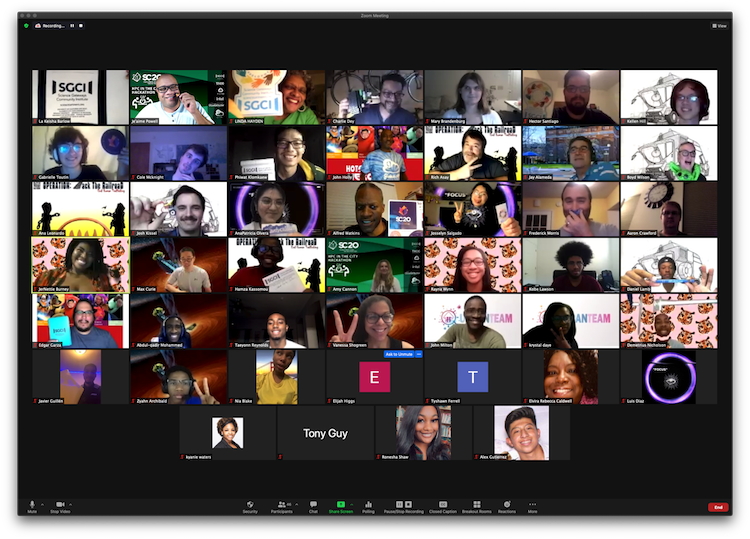Hack@PEARC20 Participants Solved Real Challenges
- Details
- Parent Category: blog
- Published on Monday, 24 August 2020 16:00
“Hack@PEARC20 was an incredible experience!"
Lena Coker
Washington State University - Vancouver
Participant, Hack@PEARC20
By Claire Stirm
The HackHPC@PEARC20 took place in July 2020 at the first PEARC virtual conference. Thanks to the event sponsors--Omnibond, TACC, Intel, Google, and SGCI--both the participants and mentors received PEARC20 registrations, Google Cloud Platform credits, and prizes. During the 53-hour event, up-and-coming programmers both applied and honed their skills while addressing real-world problems connected to multiple science gateways.
The group was split into four teams who worked on four different projects.
Team QuickVis, aka Charlie’s Angels, were the winners of the Viewers’ Choice. Charlie’s Angels worked on a fully functioning toolset that helps users display data as a map or graph through an online Mapping Tool in Jupyter Notebooks. The team started with a static map, a nonfunctional file uploader, and a rough, single-page website template. Throughout the hack, they worked closely with their mentor, Charlie Dey from the Texas Advanced Computing Center (TACC). They completed the beginnings of a Flask application to provide fundamental statistical analysis on any dataset uploaded by a user.
Team Pipeline A, aka Three A-migos, won the Best Presentation award. Three A-migos started with the user story, “As a data scientist, I know a little Python and have geo-spatial time-series data that I want to visualize on an interactive, regional heatmap. My goal is to publish this visualization for a large, public audience.” The team started focused on sourcing desired data, cleaning and organizing the data, and outputting the data for use in a Plotly dash. Working primarily in Python and CSS, the team implemented their project by mapping the spread of COVID-19 in the United States with data sourced from the New York Times. They worked closely with their mentor, Joon Yee Chuah from TACC, and completed their COVID-19 regional-heatmap visualization of the United States.
Team Delta worked on modifying a visualization to be interactive using a VNC Server and a VNC Client. The gateway, which uses a community login, gave the challenge to implement a solution for the interactive visualization. The team worked on a solution to connect to Stampede to launch a VNC server as part of a batch job to create a URL for the visualization. They also worked on connecting the VNC server from a Client to be able to launch the Server. The team did face the additional developer challenge of working through language updates while using Python. Their mentor, Sudhakar Pamidighantam from Indiana University, helped guide them through these issues, and the team came away with a lot of lessons learned.
Team Viz Pipeline 1 worked on the challenge of helping parents protect their children during the COVID-19 pandemic and illustrating the correlation between reopened public schools and COVID cases. The team used APIs to get data from the schools and from the new COVID cases being reported. Viz Pipeline 1 used Plotly, Dash, and Pandas to create a webpage that showed graphs of the United States with a slider to look back in time at cases for each county in the past 30 days. Their mentors, Brandi Kuritz from TACC and Rich Asay from Omnibond, helped guide the Viz Pipeline 1 team during the hack.
Unique to this year’s hack, participants walked away with $50 from the sponsors, and the Viewers’ Choice winners and Best Presentation winners received an additional $100 per team member.
One of the Hackathon organizers, Je’aime Powell, a Senior Systems Administrator at the Texas Advanced Computing Center, wrapped up the Hackathon awards ceremony advising the participants, “This Hackathon is not a bubble. Please take advantage of the opportunity.” He went on to say, “We need you in the server rooms and beside us.” The Hackathon is an excellent opportunity to provide hands-on experience for students by working with mentors on real problems that challenge full-stack developers.
Lena Coker, a member of the Charlie’s Angels team and student at the Washington State University - Vancouver, shared that the Hackathon “was an incredible experience!” Lena also participated in the SGCI Summer 2020 Coding Institute. Other members of the Charlie’s Angels team shared that they “loved the community and their willingness to teach and connect to resources,” and that the team “learned a lot” through the course of the Hackathon. The Three A-migos also shared that they enjoyed the Hackathon and thought the experience was “awesome all around!”
The Hack@PEARC20 was organized by the Science Gateways Community Institute and was sponsored this year by TACC, Intel, Omnibond, and Google Cloud Platform. The next hack, SC in the City Hackathon (HACK@SC20) is scheduled to kick-off November 5th! Visit http://hackhpc.org/#signup for more information.